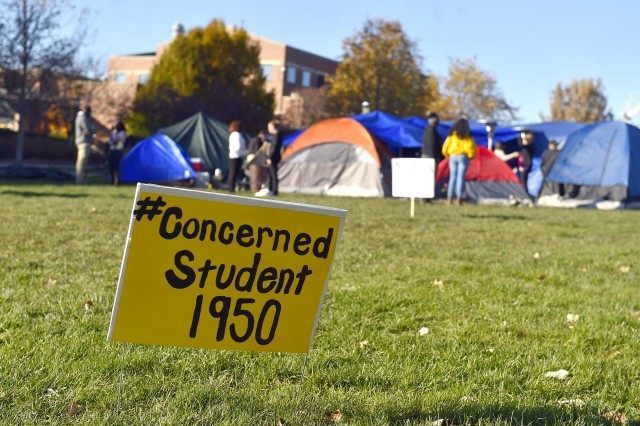The controversial protest group “Concerned Student 1950” may have been permitted by University of Missouri administrators to break a decade-old policy against certain forms of protest on campus.
According to the University of Missouri System’s Collected Rules and Regulations, “no University building, or part thereof, or grounds may be occupied as living rooms or bedroom except those duly set aside for such purposes.” According to The Kansas City Star, this policy was enacted in 1949 to ensure that students slept indoors in safe conditions.
Despite this rule, University of Missouri Police Chief Doug Schwandt claims that campus administrators granted protesters special permission to camp on one of the campus’ main quads.
One of the students who led the protests, Jonathan Butler, has received significant attention for his activism at the University of Missouri. He embarked on a speaking tour with celebrity talent booker All American Speakers and has spoken at the law schools of Duke and Harvard. However, he has recently come under fire after it was revealed that “he’s chronically stolen items, denigrated low-income workers, and made troubling comments about women and drugs.”
Butler, who is considered to be a prominent voice in the national conversation about the African-American struggle, is the son of a railroad executive who earns an annual salary of $8.4 million, according to regulatory filings.
In 2015, the protests orchestrated by Butler and the other students who comprised “Concerned Student 1950” culminated with the resignations of University of Missouri System President Tim Wolfe and University Chancellor R. Bowen Loftin. One of the main reasons for Wolfe’s resignation was a hunger strike conducted by Butler.
Today is the National day of action! @blacklibco2015 and Million Student March #TheStruggleContinues pic.twitter.com/D3uDLTqdmh
— ConcernedStudent1950 (@CS_1950) April 13, 2016
Since the protests, the university has displayed a much stricter adherence to their rules about occupying campus space. When “Concerned Student 1950” attempted to occupy an administrative building in April, they were quietly told that they would face significant consequences, up to and including expulsion.
#StudentBlackOut #ConcernedStudent1950 pic.twitter.com/nKqOWMs1jB
— muva doc (@yannamo_) April 13, 2016
According to campus Police Chief Doug Schwandt, he doesn’t foresee another campus protest of a similar magnitude in the near future. “I don’t think that would happen again,” Schwandt said. “I think there’s lessons learned from that. I doubt there would be approval to allow overnight camping again on campus.”
Tom Ciccotta writes about Free Speech and Intellectual Diversity for Breitbart. You can follow him on Twitter @tciccotta or on Facebook. You can email him at tciccotta@breitbart.com

COMMENTS
Please let us know if you're having issues with commenting.